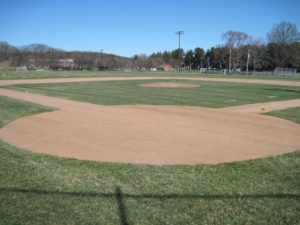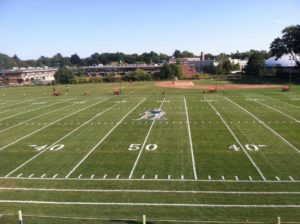SFMA: When the COVID-19 pandemic began, were there any changes to your teams’ day-to-day operation? What is the current status of Public Works in Lexington?
DP: “Our staff has been back at full capacity since June 1. When the pandemic hit in mid-March,  we broke everyone up into shifts, working alternate days on a staggered schedule. This allowed us to keep everyone fully paid and maintain the numbers of employees on-site while completing as many tasks possible. This revised schedule did have an impact on getting us ready for any type of season we were looking at.
we broke everyone up into shifts, working alternate days on a staggered schedule. This allowed us to keep everyone fully paid and maintain the numbers of employees on-site while completing as many tasks possible. This revised schedule did have an impact on getting us ready for any type of season we were looking at.
Like many communities across the country, Lexington cancelled all spring sports and events. It wasn’t until June 1 when we enabled resources to go back out into the fields and the athletic spaces, so the pandemic set us behind a couple months.”
SFMA: How did you and the team prioritize different roles and responsibilities with less manpower than usual? Was it difficult to get back up to speed when the full staff returned?
DP: “The lack of personnel forced us to refrain from field preparation and solely commit to minimal mowing and other less time-consuming functions. Projects such as overseeding and drainage enhancements were put on hold.
When we returned to full staff, sports were allowed back on the facilities within three weeks. This included baseball, softball and soccer practices, but not games. Fast forward to now, and we have a regular slate of games on six to 10 fields every day that need appropriate preparation.”
SFMA: Were there any lessons you learned during the pandemic? If so, what were they?
DP: “Knowing what we know now, if we ran into another pandemic, or anything similar, we’d strategize more effectively. To assure isolation of the entire park facility, having an agenda in place where employees can operate consistently and productively while staying socially distanced, is critical for success.
From an operations standpoint, we should have supplemented contractual services along the way. Most duties are taken care of in-house, but with the reduced schedule, a budget is required to bring in outside resources. This way, if we need a backup, we’d have one available.
Lastly, with local suppliers shut down, it was difficult for us to get grass seed, fertilizer and other necessary supplies.  We’ve talked internally about this, and plan to make orders for these materials in December or January, instead of March and April, so we have things already on hand.”
We’ve talked internally about this, and plan to make orders for these materials in December or January, instead of March and April, so we have things already on hand.”
SFMA: Did you collaborate with others in the industry? If so, what did that consist of?
DP: “We participated in the SFMA Town Hall Meetings, and I was fortunate enough to moderate one of them. New England Sports Turf and the New England Park Association had sessions as well. It was great to engage with all of the intelligent and experienced professionals in our industry because everyone was able to hear what each other is doing at their facilities and share experiences, good and bad.”
Other Sports Field Management Resources
Route to Recovery – Healing Through Sports Part I
Route to Recovery – Healing Through Sports Part II
An Ever-Evolving Roller Coaster for Parks and Recreation Sports Field Managers
Despite Canceled Season, Sports Field Managers in Minor League Baseball are Plenty Busy
Capitalizing on the New Norm: Sports Field Managers Using Staff Creatively Amidst Pandemic
Looking to share what you’ve experienced thus far as a sports field manager in the pandemic? Contact Nate Rubinstein at nrubinstein@buffalo.agency.